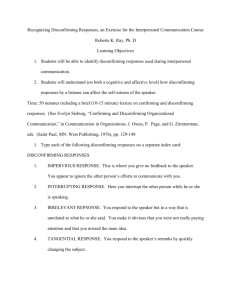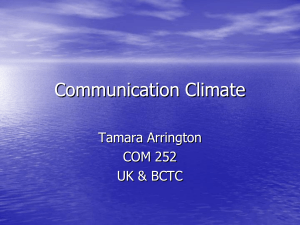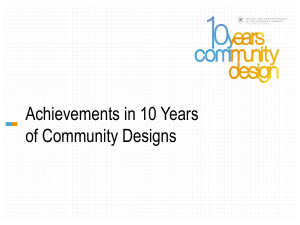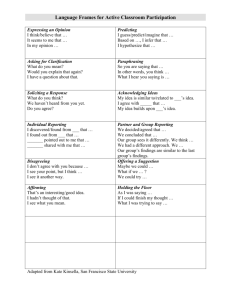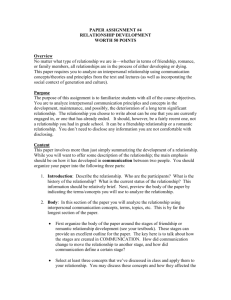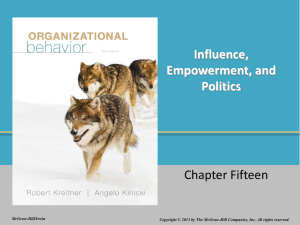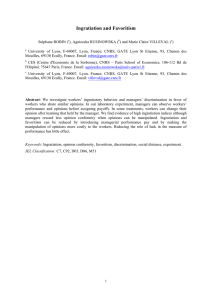Improving Interpersonal Relationships
advertisement
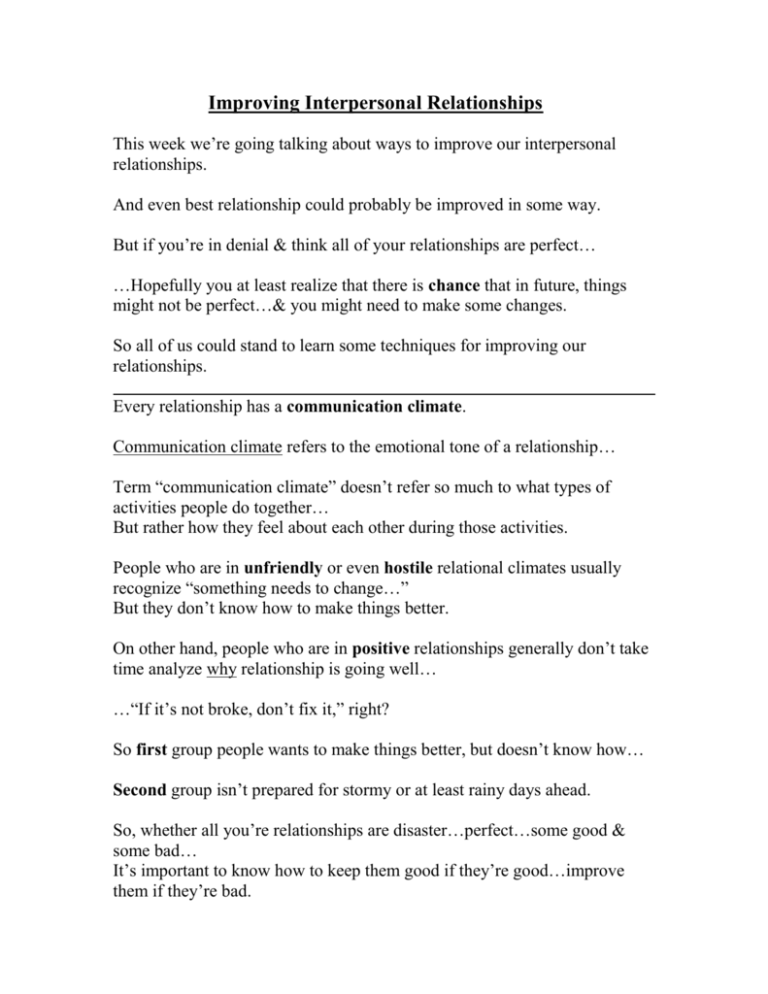
Improving Interpersonal Relationships This week we’re going talking about ways to improve our interpersonal relationships. And even best relationship could probably be improved in some way. But if you’re in denial & think all of your relationships are perfect… …Hopefully you at least realize that there is chance that in future, things might not be perfect…& you might need to make some changes. So all of us could stand to learn some techniques for improving our relationships. Every relationship has a communication climate. Communication climate refers to the emotional tone of a relationship… Term “communication climate” doesn’t refer so much to what types of activities people do together… But rather how they feel about each other during those activities. People who are in unfriendly or even hostile relational climates usually recognize “something needs to change…” But they don’t know how to make things better. On other hand, people who are in positive relationships generally don’t take time analyze why relationship is going well… …“If it’s not broke, don’t fix it,” right? So first group people wants to make things better, but doesn’t know how… Second group isn’t prepared for stormy or at least rainy days ahead. So, whether all you’re relationships are disaster…perfect…some good & some bad… It’s important to know how to keep them good if they’re good…improve them if they’re bad. Now obviously, everything you need to know about relationship success isn’t covered here. First of all, focus of this class is on communication… And while communication is important in interpersonal relationships… …The psychological, sociological, experiential elements that play part in every relationship are not addressed in this class. Nevertheless, communication is important… And lectures this week & your assigned readings designed to demystify communication in interpersonal relationship. And once mystery is taken out of any complex activity…It’s almost impossible not to get better at it. Ex. Shooting: *Pre-Christie General knowledge =follow through, square up, use legs… But mostly mystery. *Post-Christie: LASER METHOD Whether or not our relationships have positive or negative communication climate depends largely on… …Ratio of confirming messages to disconfirming messages in our communications. Confirming messages indicate to other person that we value them…that they are important to us & we respect them. When confirming messages predominate in relationship…positive communication climate usually exists. Disconfirming messages on other hand, indicate that we do not value or respect our communication partner. When disconfirming messages predominate…negative comm. climate exists There are three types of confirming responses: Recognition, Acknowledgment, Endorsement. -Recognition is weakest type of confirming message…Endorsement is strongest type confirming message. Recognizing messages do just that…they “recognize” that other person exists. It seems obvious that if we don’t recognize others, our relationships w/ them will suffer… But if you think about it, there are many times when we don’t recognize other people…even when we do want relationship w/ them. Ex. How many times has someone left message on your voice mail & you thought… “You know, I’m not in mood talk right now…I’ll just tell them I didn’t get message, or I was so busy I forgot.” Ex. Think about this class or other classes you have. Group activity…talk to/ meet someone once…then never say “hi” again. Ex. How about when you see somebody on campus from high school & intentionally look other way so you don’t have talk to them? Or go out to your car at home & pretend not see neighbors so don’t have to wave? And most of time we’re not really trying to avoid other person…we’re just lazy or selfish & don’t want to force smile or wave or say “hi.” When we don’t recognize others…we rationalize our actions away…pretend like its not big deal. But when others don’t recognize us… …When our calls aren’t returned or somebody we know pretends not see us & walks by w/ out saying anything…we hold it against them for weeks. Usually, recognizing others is worth time & energy. -So Recognition involves head nod, eye contact, or hand shake… But Acknowledgment involves all those things…but also includes (1) Listening to other person… (2) Paraphrasing what they say… (3) Asking questions… (4) Occasionally advising or analyzing. -Finally, most powerful type of confirming response is to Endorse what others are saying. Whereas Acknowledging others shows interest in them…Endorsing others indicates we agree with them. Occasionally, it’s true that opposites attract… But more often t/ not, If you disagree w/ someone on Political, Economic, Religious, Social, or Moral issues…you’re relationship going to be rather hostile. So Endorsement involves agreeing w/ others…but it also involves complimenting or even praising them. Persuasion researchers call this type of communication Ingratiation…In real life people call it “Kissing up,” “Brownnosing,” “Sucking up,” etc. There are number of positive effects related to this communication strategy… But before we discuss those effects, remember that you’re behaving immorally & unethically if you: (1) Don’t agree w/ someone & pretend you do (2) Pay someone compliment you don’t think they deserve (3) Praise somebody insincerely…just to get what you want from them. So honest ingratiation is ethical…Dishonest ingratiation is unethical. That said…There are three types of ingratiation: Other Enhancement, Opinion Conformity, Self-Presentation. Other Enhancement involves paying somebody compliments or engaging in flattery… Opinion Conformity involves initially agreeing w/ someone’s statements, ideas, & views. A variation of this technique is to (a) Initially disagree with target person, (b) Then agree…giving illusion other person changed your mind. Self-Presentation involves trying make yourself look good. Obviously…the more indirect your self-presentation strategy…more successful you’ll be. Ex. Instead of saying “I’m really generous & unselfish…” Wait for person you’re trying to impress to ask you go somewhere, then say “I’d like to, but I volunteer at homeless shelter that day.” OK…so Other Enhancement, Opinion Conformity, & Self-Presentation three types of ingratiation strategies… But why does ingratiation work so well? -First, ingratiation tends to increase liking. In other words…we’re more persuaded by people we like than don’t like, & ingratiation makes others like us. -Second, ingratiation makes us appear similar to others…& we tend to be more persuaded by people who we perceive as similar to us. -Third, ingratiation can attach positive social label to someone…which person then feels they have to live up to. In other words, if you say to someone “You’re most generous guy I know…” & then ask for $5 couple days later…they want live up to social label “generous.” Positive Social Labeling works well w/ overachievers & self motivated people… Ex. 6th grade Basketball OV High School / Dr. Matz. *Positive Social Labeling doesn’t work well w/ underachieving, unmotivated people… *With these people use threats & challenges… Ex. Ad in movie Miracle: Kurt Russel: “Why don’t you be Hockey Player for once!” Player: “I am hockey player!!!” Russel to assistant coach: “Think that’ll get him going?” *Remember, if you threaten or challenge overachiever/selfmotivator…Backfire! Ex. Butch & Me…Freshman year. If you positively label underachiever who can’t motivate himself or herself…Also Backfire. Ex. Del Harris & Shaq. I could cite million studies stating benefits of ingratiation… But just know that if ingratiation is perceived as sincere…It works very well as persuasive strategy…Even if compliments or praise you’re giving are false! For example… If your significant other asks you “Am I funny…” & both of you know he/she really isn’t…They still will like you more for saying they are. BOTTOM LINE: Endorsing others is strongest way create positive relational climate…but there are some ethical issues involved…So let your conscience be your guide. So if we want create positive communication climate in our relationships… We need to Recognize, Acknowledge, & Endorse others. On other hand…if you genuinely dislike people…don’t want them talking to you… …I recommend disagreeing with, attacking, or ignoring people around you. Communicologists call disagreement, personal attack, & indifference Disconfirming Responses… Because they tend to be perceived by other person as sign you don’t respect or value them. We never have to personally attack or ignore others…but sometimes we do need to disagree w/ them…& when we do, we have face consequences. Doing right thing doesn’t always make friends… I wish it did. *In first stages of our relationships…depending on whether we use confirming or disconfirming messages…a communication climate develops. After climate is formed…It can develop into what social scientists call Communication Spiral. A Communication Spiral is “A reciprocating communication pattern in which each partner’s messages reinforces the other partner’s messages.” In other words…If I say something nice to you…You say something nice to me…I say something nice you…and so on. And of course…If I insult you…you insult me… -What we have to remember is that all close relationships go through both these cycles… …And it only takes one disconfirming comment to change positive cycle to negative one… …But, it may also only take one confirming comment to change negative cycle to positive one… But remember…both people have to be committed to relationship for it to work. Both partners have to be willing to humble themselves & send that confirming message to change negative cycle’s pattern. In other words…if same person always swallows his her pride & makes confirming comment change negative cycle, relationships not going to work. OK… It should now be obvious that whether we confirm or disconfirm other’s messages plays large role in creation of a communication climate. But we also need to try to engage in supportive rather than defensive communication practices. First, whenever possible, we need to favor Descriptive Communication over Evaluative Communication. Evaluative language passes judgment on other person’s behavior. Ex. If you’re friend always talks about himself, an evaluative response would to that tendency would be say “You’re very self-involved person.” Notice that focus of this response is on other person, not on you. Usually, evaluative language…or “You” language…isn’t taken well by other person because it implies superiority on part person making comment. When I call you “self-centered,” I’m indirectly stating that I am not selfcentered… And obviously, nobody likes being around people who think they’re better than everybody else. So instead of dealing w/ your friend’s enlarged ego w/ “You” statement of evaluation… …Try using the “I” language of descriptive communication instead. “I” language takes focus off other person & puts it on you…which greatly reduces chance other person will interpret your comment as judgmental. Descriptive language includes: (a) A description of other person’s behavior (b) A statement summarizing how speaker’s behavior is affecting you. So…instead of saying “You’re very self-involved person…” …Try “When you don’t express very much interest in what I have to say, I get impression you don’t have much interest in my opinions or feelings.” Now I know some of you are thinking, “There’s no way in hell I’m ever going talk like that…” …and it does take some getting used to. Let me read you passage from Time Magazine about couple who went to marriage counseling… To show you that in real world people use techniques we’re talking about this class w/ some success. “Couples learn in marriage counseling to set aside a time each week to talk over their problems. These discussions follow certain rules. The word “I” is allowed; “You is not.” “While Victoria is speaking, Rod interjects to ask a question. That’s not allowed he’s told. Later, Rod doesn’t paraphrase correctly. He tries again. When he gets it right, Victoria smiles and says, “Yes!” That’s good.” For a moment they have connected.” So yes, techniques we’re talking about are little artificial…but they work as long as they’re not overused. Sometimes we just have to ignore or forgive others w/ out saying anything… But if we have to say something, it’s better to use descriptive language. -Another communication strategy that creates a defensive climate in relationships is when receivers use Controlling Messages. A controlling message is one where sender suggests or imposes a solution on receiver w/ little regard for receiver’s needs or interests. Ex. Girlfriend: “We stay home every night & watch sports…can we please get out of house?” Boyfriend: “Fine. We’ll go to the Laker game.” Recipients of controlling messages often feel as if their ideas are being disregarded or devalued & that nothing they say will be listened to. As text puts it, the unspoken message behind controlling message is: “I know what’s best for you, and if you do as I say, we’ll get along. Opposite of “Control Orientation” is “Problem Orientation.” When communicators use “Problem” approach…they focus on finding solution that satisfies both partners needs. -Communicators must also avoid using manipulative or underhanded strategies to get their way… …Instead they should always be as straightforward w/ each other as possible. Ex. Wendy’s “Tastes Great, Open Late” Commercial. -New Guy: Bob -“Doesn’t, big juicy cheeseburger sound good?” -Bob: “If place open this late…I’d buy & drive.” -Bob new friends might’ve lost their fifth Poker player because of their manipulative tactics. -Communicators must also be make conscious effort to be empathetic w/ others…not indifferent. We’ve talked about empathy & indifference more than enough in here…so let’s move on to next strategy choice. -Next, Communicators in healthy relationships make sure not to send messages that have an air of superiority. 99% people on this planet are not rapists, molesters, murderers, or hardened criminals… And this means that you & I are not better or worth more than 99% of people on this planet. Even if you or I are smarter, better looking, & wealthier than someone else…we are not better than or worth more than them. People who really understand this are happiest people in world... they are also best communicators. Think about it… We admire people like Mother Theresa, Martin Luther King, & Nelson Mandela because they have so much to be egotistical about…but instead are always humble. And just because you’re not better than anybody else doesn’t mean you’re not valuable… But problem is, we assign value to ourselves by comparing ourselves to others. That’s why children are so cruel to each other… They’re creating positive identity for themselves by putting others down. But as educated adults…we shouldn’t have to do that anymore. Nobody is more attractive, nobody is more likable, nobody is more fun to be around than someone who is comfortable in their own skin. Being humble is win-win situation… -Humble people are happier because they’re not always worried about comparing themselves to everybody else… -And humble person’s friend are happy because he/she is such pleasure to be around. Finally, how dogmatic or provionalistic we are has great deal to do with how defensive or supportive our communication climates end up being. Dogmatic messages give impression that speaker’s mind is already made up & that nothing anyone can do or say will change it. Ex. Let’s say your friend is Republican & you’re Democrat… And you’re arguing about whether Federal government should be more powerful than individual State gov’ts. A dogmatic statement in this situation might be: “It’s obvious to anyone who’s know anything about politics that states can’t govern themselves…but go ahead I made my point, so go ahead, make yours. This type statement shows nothing your friend might say will change your mind…but you’re pretending like it will. On other hand a Provisionalistic statement… …Or a statement that indicates speaker is willing to consider viewpoints of others…might be: “Well I have my opinions about government…but I’m always open to new points of view…Go ahead, I’d like to hear what you have to say.” So to some extent, we do have control over climate in our interpersonal relationships. Unfortunately though…there is no such thing as conflict-free relationship. And while very few of us like conflict…effectively managing it can lead to healthier, stronger, & more satisfying relationships. We will define Conflict as: “An expressed struggle between at least two interdependent parties who perceive incompatible goals, scarce rewards, and interference from other parties in achieving their goals. Before we talk about some ways to manage conflict…Let’s go over some characteristics of conflict. -First, strategies & tactics we’re going to talk about are useful only if both people in relationship know there is problem. In other words…Both parties must know there is problem before we can define problem as “Conflict.” Obviously, if you have problem w/ someone, or they have problem w/ you… …You can’t resolve situation until you or other person knows there’s something to resolve. -Second characteristic of conflict is that both parties involved must view other party’s gain as their loss. In Middle East for example, Israeli’s looks at any demand for land by Palestine as loss for Israel… …Palestinians look at any Israeli desire to hold onto land as loss for Palestine. Now whether or not Israelis & Palestinians will ever reach mutually satisfactory agreement… Or whether fair compromise even exists…I don’t know. But in most conflicts, solutions that let both people achieve their goals do exist… …However, as long as one person perceives that they are “Losing” & other person is “Winning,” effective conflict resolution cannot occur. Ex. Curly Sue…The Bunny…Grandma Wright. -Third, another characteristic of conflict is perception of Scarcity. In most conflicts, people believe there isn’t enough of some valuable resource for everybody to have some… …Of course, nobody wants to be left out…Conflict arises when one person or party feels left out. In close relationships, Time & Money are two scarce resources most couples fight about. In fact, vast majority of divorces in this country occur because of disagreements about: (a) How to spend money (b) How much money family needs (c) Whose job it is to earn money Which is why I strongly recommend that you guys consider financial compatibility when you choose people you date. Unfortunately, most young people do not consider financial compatibility when considering potential romantic partners… But again, divorce statistics indicate they should! The primary reason why most teenagers & young adults don’t consider money issues to be as important as physical attraction or personality fit when it comes to romantic relationship… …Is because we’ve been taught from young age that people who are materialistic & concerned about money are shallow & superficial. Ex. Wedding Singer…Adam Sandler & Drew Barrymore…Skanky Brunette… But she was right…Money does matter…Especially in Southern California where everything extremely expensive… If you want life your parents provided for you growing up…You’re going have to make twice what they made to have it. I’m not saying money is only thing that matters…it’s not…But it is something to consider… Unfortunately…most people don’t consider financial compatibility until it’s too late. -Fourth & Final characteristic of conflict is Interdependence. The more dependent on others we are…More angry we get when they don’t see things our way or do what we want them to do. Interdependence is why so many children resent & hold grudges against their parents long into adulthood or sometimes for their entire lives. Parents are child’s last resort… If teacher let’s you down…you turn to your mom or dad. If your coach is being unfair…you can count on mom & dad support you. If your friends don’t invite you out…you can always hang out w/ folks. *But as child, if your parents aren’t there for you…where do you turn? There’s nowhere else to go…You’re trapped, you feel hopless… …& of course, you resent your parents for making you feel this way because you have to depend on them…even if you don’t want to. -The process is same in committed adult relationships like marriage. As married adult…if your spouse isn’t there for you…where do you turn? …You’re too old to turn to your parents for support… …Nobody at work can really do anything but listen… & Your friends are married w/ their own children…They really can’t help… As result…You have to rely on your husband or wife…Again, even if you don’t want to…There’s nowhere else to go. So when he/she lets you down…The feelings of anger, betrayal, & bitterness are 10 Times what they would be if co-worker or friend did same thing.
